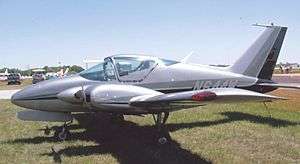Wing Derringer
The Wing D-1 Derringer is an American light twin-engined two-seat monoplane tourer designed by John Thorp and developed by the Hi-Shear Corporation and built by the Wing Aircraft Company.
| D-1 Derringer | |
|---|---|
 | |
| Wing D-1 Derringer at Lakeland, Florida in April 2009 | |
| Role | Light twin-engined touring monoplane |
| National origin | United States |
| Manufacturer | Wing Aircraft |
| Designer | John Thorp |
| First flight | 1 May 1962 |
| Number built | 12 |
Development
The D-1 Derringer light twin design was originally designed in 1958 by John Thorp as the Thorp T-17 a twin-engined development of his Thorp T-11 Sky Scooter. The design was taken over by George Wing of the Hi-Shear Corporation. The Derringer is a low-wing cantilever monoplane with a retractable tricycle landing gear. It had room for two in an enclosed cockpit with an unusual up and backward opening canopy. It was powered by two 100 hp Continental O-200 engines, one mounted on the leading edge of each wing.[1] The prototype aircraft (registered N3621G) first flew on May 1, 1962[2] at Torrance. A second prototype flew in November 1964 but crashed a few weeks later due to an in-flight airframe failure.[3] A static test aircraft and two more aircraft were built for testing which resulted in the award of a type certificate on December 20, 1966.[2] The aircraft did not go into production due to internal problems within the Hi-Shear Corporation.
The Derringer used manufacturing techniques that were considered new at the time it was developed. Butt-joined, flush-riveted, chemically-milled and stretched skins are used throughout the airframe.
Development of a two-seat Coin/military trainer version designated Wing D-2M Derringer was begun[4] but failed to develop further than the design stage.
In 1978 George Wing left Hi-Shear and started the Wing Aircraft Company.[4] The company built one-pre-production aircraft followed by six production aircraft, entering bankruptcy in July 1982, after which only one further aircraft was built before seven unfinished airframes were sold.
Nine D-1 aircraft were on the U.S. civil aircraft register in May 2009.
Specifications (D-1)
Data from Jane's All The World's Aircraft 1980-81 [5]
General characteristics
- Crew: 2
- Length: 23 ft 0 in (7.01 m)
- Wingspan: 29 ft 2 in (8.89 m)
- Height: 8 ft 0 in (2.44 m)
- Wing area: 121 sq ft (11.2 m2)
- Aspect ratio: 7
- Airfoil: NACA 652-415
- Empty weight: 2,070 lb (939 kg)
- Max takeoff weight: 3,050 lb (1,383 kg)
- Fuel capacity: 88 US gal (330 L; 73 imp gal)}
- Powerplant: 2 × Avco Lycoming IO-320-B1C 4-cylinder air-cooled horizontally-opposed piston engines, 160 hp (120 kW) each
- Propellers: 2-bladed Hartzell constant speed propellers, 5 ft 6 in (1.68 m) diameter
Performance
- Maximum speed: 201 kn (231 mph, 372 km/h) at sea level
- Cruise speed: 184 kn (212 mph, 341 km/h) at 13,000 ft (4,000 m) (65% power)
- Stall speed: 55 kn (63 mph, 101 km/h) (landing gear and flaps down)
- Range: 1,007 nmi (1,159 mi, 1,865 km) at 10,000 ft (3,000 m) (econ. cruise)
- Service ceiling: 19,600 ft (6,000 m)
- Rate of climb: 1,700 ft/min (8.6 m/s)
See also
Aircraft of comparable role, configuration and era
- Jurca MJ-6
References
| Wikimedia Commons has media related to Wing Derringer. |
- "The Loaners". Flying: 51. May 1976.
- J W R Taylor 1982, p. 486.
- AAHS Journal: 73. Spring 2004. Missing or empty
|title=(help) - J W R Taylor 1982, p. 487.
- J W R Taylor 1980, p.454.
- Simpson, R. W. (1991). Airlife's General Aviation. , England: Airlife Publishing. p. 366. ISBN 1-85310-194-X.
- Taylor, John W. R. (1980). Jane's All The World's Aircraft 1980-81. London: Jane's. ISBN 0-7106-0705-9.
- Taylor, John W. R. (1982). Jane's All The World's Aircraft 1982-83. London: Jane's Yearbooks. ISBN 0-7106-0748-2.
- Taylor, Michael J. H. (1989). Jane's Encyclopedia of Aviation. London: Studio Editions.